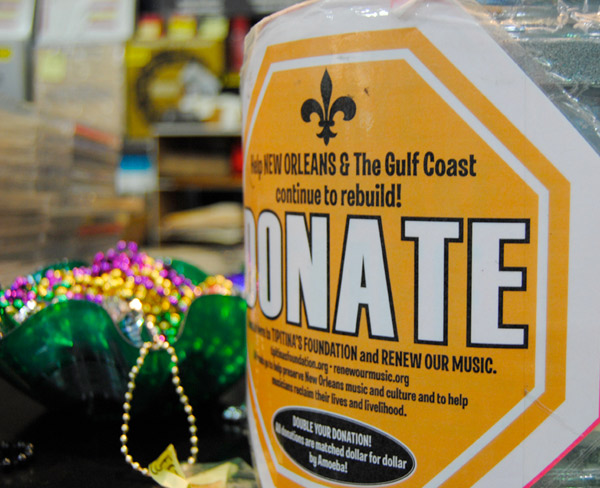Each band, each singer/songwriter, is a little business. An indie, do-it-yourself—scratch that, do-everything-yourself—business, where livelihoods often hang by a six-string.
In New Orleans, musicians returning post-flood faced an even harsher music business climate than before. In recent years the Big Easy has seen its regional music economy go from Mardi Gras to Mardi Mince. Fewer gigs are available, minimum-payout guarantees from clubs are less common, and audience sizes are smaller. And although these trends can be seen across North America, New Orleans’ large musician population, coupled with ongoing flood recovery efforts, put musicians in New Orleans on a particularly steep climb towards economic recovery.
But one grass-roots group is trying to give these musicians a foot-hold in the music-biz mountain. Tipitina’s Music Office Co-operatives are helping musicians across Louisiana land gigs and re-establish their music careers by providing them with the professional tools and networking opportunities to help them get back in the spotlight.
With 2012 designated the International Year of Co-operatives by the United Nations, it’s high time Tipitina’s Music Office Co-ops spent some time in the limelight themselves.
From a business perspective, pursuing music may seem like a tone-deaf decision. I mean, let’s face it: music requires years of training, pays few (if any) dividends, and necessitates an astronomical investment in overhead. But music is just one of those wonderful irrational business pursuits, it’s a passion. Some may argue even a need. Which makes it a perfect fit for a co-op.
A co-op is an alternative business model that pools resources via membership fees to accomplish what an individual couldn’t do on their own. Although we most often hear about housing or farming co-ops, the model can be applied to almost any business. For Music Office Co-op members, that business is music.
“The Co-op program was initially created as a way for local musicians to have an inexpensive place where they could take care of their music business tasks,” says Mark Fowler, Manager of Tipitina’s Music Office Co-op in New Orleans. “As time went on, we discovered that many members needed additional resources, such as use of audio recording and editing gear, video editing, legal assistance and so on. It pretty quickly evolved into a well-resourced DIY-based program.”
Four Tipitina’s Office Music Co-ops exist across Louisiana, but it all started in New Orleans. This founding Music Office Co-op shares its name and address with a famous Big Easy music club, Tipitina’s. The club itself has a history of music munificence: it was founded in 1977 by friends of the influential New Orleans pianist Henry Roeland Byrd (a.k.a. Professor Longhair) as a place for him to play in his later years. The juke joint is named for one of Longhair’s most ivory tickled tracks: Tipitina.
In the mid-1990s the club was saved from financial troubles by Roland von Kurnatowski, a real estate investor who became intrigued by the club’s history and fierce following. In 1997, he and his wife, Mary, created the Tipitina’s Foundation. By leveraging the for-profit club to serve the nonprofit foundation, the venue has stayed true to its original purpose of helping musicians.
The Music Office Co-ops provide an exhaustive range of services to their musician members, from office equipment, to professional recording and editing software, to health services such as hearing tests, to legal advice regarding licensing and copyright issues. So stepping in to help the music community following Hurricane Katrina was only natural.
“The first few years after Katrina, we were able to replace lost instruments and gear through generous donations from around the country and assist returnees in finding the social services they needed to help put their lives back together,” says Fowler.
And through co-operation, New Orleans musicians are getting back to business. A 2010 economic survey from the Tipitina’s Foundation reports “musicians statewide are finding ways to build their careers despite a smaller regional music economy and fewer audience members…Co-op participation has proven critical in the individual and collective recoveries of the artists.” In fact, a survey of co-op members reports a 13 per cent increase in revenue from music since 2009 alone.
But forget the numbers, forget all the expensive editing software, the iMac computers, the professional workshops and the training. The Music Office Co-ops are most valuable for providing simple business tools. We’re talking business bread-and-butter. Access to email and the internet; printers and graphic design tools for creating posters and flyers; and the quintessential business basic: business cards.
But break it down even further and perhaps the most valuable service the co-ops provide is even more basic: a community of positive support. “I believe having a positive, non-exploitive atmosphere for artists helps everyone,” says Fowler. And he’s right.
In such a challenging profession as indie music, where today’s consumers expect their musical interests to be supported full-tilt (from entertainment included with the price of a pint, to big-label-quality tracks for their iTunes library on demand, to a digital presence that spans every social media mouthpiece in existence), a community where musicians have a space where they feel supported, where “indie” doesn’t have to mean “on your own,” where a smile and a helping hand—the milk of human kindness—are in fact the business tactics that beget the highest returns in one of the most cut-throat industries out there. And the cool cats of New Orleans are lapping it up, getting stronger at the game, and proving yet again they’ve got nine lives and then some.
Emily Kennedy is a writer and editor based in Canada. She believes fewer people sing the blues when we all co-operate.

